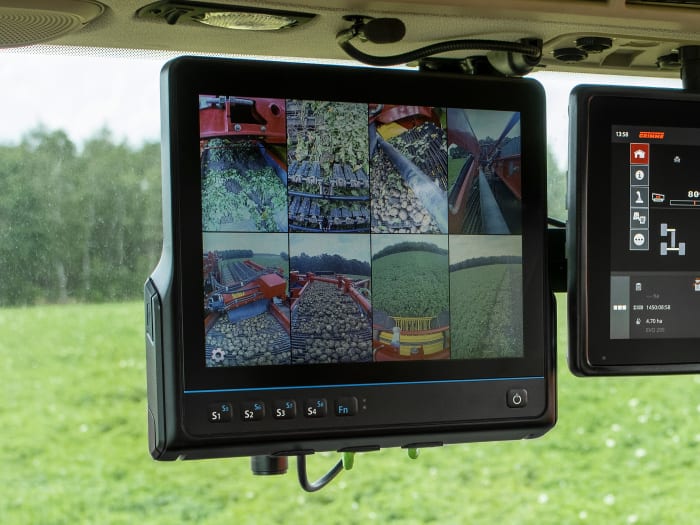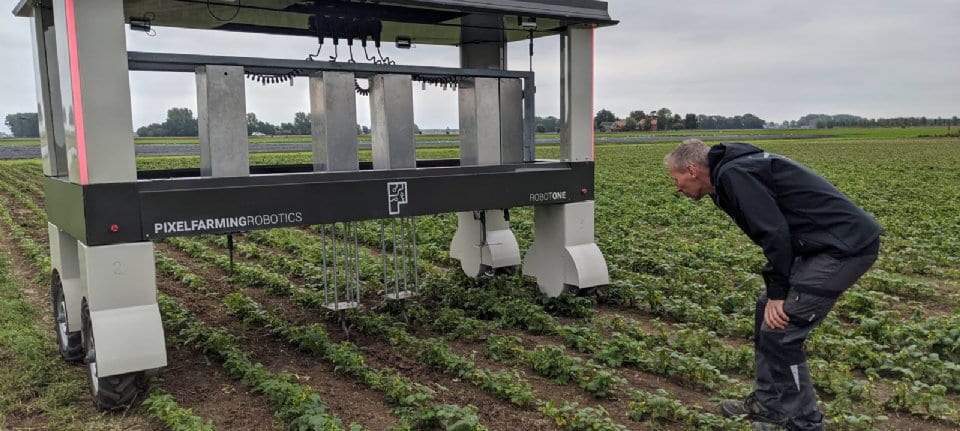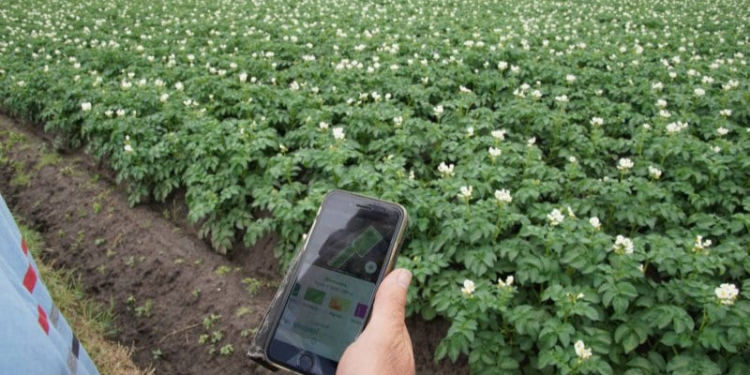From comprehensive ag tech consulting to robotic specialization and support, dealers and industry experts share their vision for how opportunities and objectives will change.
Asking dealers to dust of their crystal ball and predict where they want their precision business to be in 3, 5 or 10 years, the most common answer is “profitable.” But following up with a question on how they will accomplish that goal and there is nothing close to a consensus answer. While relationships will always serve as the foundation for sales, service and parts business for dealerships, the building blocks of those relationships are evolving as generational transition comes to many U.S. farms.
Dealers acknowledge the evolution and also their need to evolve to accommodate the economic objectives and equipment expectations of the next generation of decision-makers onthe farm.
Adoption of precision farming technology is nothing new for farm customers or dealerships selling and supporting the tools, but the value proposition is changing. Increasing expectations for the performance and profit that precision technology can deliver to farm operations — with clearly defined ROI becoming the norm — are part of the equation. Our editors assembled 7 insights from dealers and industry professionals on how, when and why dealerships business models and farm customers’ could change as precision tools and services continue to evolve.
1. Genuine Benefits of Artificial Intelligence.
AI will enable dealers and farmers to mine existing data sets (historical yield, fertility and elevation maps) to extract patterns that will inform the decision-making process. Perhaps the greatest challenge in production agriculture is management in response to weather, and most specifically nitrogen (N) management in corn, says Scott Shearer, professor and chair of the Food, Agricultural and Biological Engineering department at Ohio State University. Many factors influence supplemental N needs of the crop including precipitation and N mineralization by the soil, the latter governed to some extent by soil moisture and temperature. While predicting the weather may be the holy grail, in-season N application might be AI driven in the future.
“Current N management approaches are model driven — most likely statistical in nature based on previous N application studies,” Shearer says. “However, as we continue to collect production data over a range of weather conditions and N application practices, new AI driven approaches will better inform within in-season N management recommendations.

AI may prove to be a valuable tool when tracking crop performance during the growing season, and then helping to direct human scouts to under-performing locations within a field. Shearer notes that AI approaches will enable crop advisors to comb through significant volumes of imagery to identify fields or, areas of fields, in need of corrective treatment to mitigate crop-loss stemming from nutrient, insect or disease pressure.
“Will AI replace crop advisors or other agriculture professionals Unlikely,” he says. “However, AI will assist crop advisors and farmers to extract actionable information from volumes of data collected from soil and tissue samples, on-board machinery sensors, weather stations and remote sensing platforms.”
2. Technically Speaking… Communicate Clearly.
Leo Johnson, partner with Johnson Tractor, remembers someone 20 years ago predicting that most of their dealership service would be done on the farm or in the field in the future. Yet, he says his service shops have never been busier, and the new store they are building will double their existing service space in Rochelle, Ill. However, he also says in the future, the dealership won’t spend thousands of dollars on hard wiring for computer terminals and phones.
“Wireless video conferencing for training, sales calls, management meetings, etc. will be the norm,” Johnson says. “Nice big conference rooms built in the prior decades will be used for storage. Service department new builds will be tech driven. They’ll feature more comfort, more convenience, safer, more productivity with less people.”
Another piece of the economic puzzle dealerships will need to account for in the future is increased training, Johnson says. But not necessarily the “nuts and bolts” of farm machinery, rather the technical training will be far more critical across departments.
“Double or triple the percent of time and cost that we’ll pay in the future for employee training,” he says. “More electronic, less repair and more diagnosis. Less reaction and more forecast.”
3. Advancing Autonomy.
Farm equipment automation is on the minds of precision dealers, whether it’s a tangible reality or far-fetched fantasy within their business. But regardless of the take, it’s hard to ignore the impact the emerging technology will have on the ag industry. Looking at results of the 2020 Precision Farming Dealer Benchmark study, some 43% of responding dealers cited autonomous vehicles as an area of at least moderate importance to grow revenue during the next 3 years.
“Labor is going to be our determining factor,” says Chad Moskal, ag optimization specialist with Rocky Mountain Equipment. “Unless we can automate the service trucks and the bins, we’re still going to be drastically reducing customers’ labor costs by 50%. I think our customers don’t know how well it’s going to work and taking that first step is going to be difficult.”
Jason Riseley, Integrated Solutions specialist with Cervus Equipment, says there will be an appetite for autonomy among progressive customers. He notes two customers he works with who have been aggressive adopters of ag tech who are prime candidates for beta testing self-driving systems.
“Both customers were at their peak at the 17,000-acre mark. Their biggest challenge was the labor portion and just having enough bodies around to get the work done,” Riseley says. “They have since scaled back quite a few acres to what’s manageable for the workforce they can attain. “These customers will be our first to jump on the full autonomy bandwagon as soon as it comes forward. I still think that the first farm to get to 90% is at least 10 years away, but there will be certain areas of the farm that will make it to full autonomy
before that.”
4. Sales Transition & Triage.
Ten years from now — maybe less — a dealership’s business will be drive by its precision department. So says Jim Henderson, executive partner with Exemplary Innovations. He suggests a specialized approach for each farm including software, data, hardware, equipment and people, will be cultivated though the technology they utilize on their operation and how its supported.
“Only 15% of salespeople will make the transition. Thousands of new technicians will be needed. Triage specialists will become the front line of support,” he says. “Successfully navigating the bridge to 2030 and smart solutions from today will determine who crashes into the wall and who finishes the race. A potential organizational chart in 2030 will also have operations specialists, sales ops, data ops, support ops, etc.”
While salespeople have been counted on to nurture customer relationships by developing a rapport, which can lead to long-term loyalty, dealerships are seeing some of that erode as the next generation of customers move into farm management roles.
“We see that next generation being much more informed when they come into the dealership,” says Owen Palm, CEO of 21st Century Equipment. “They’ve done their research online and our salespeople better be able to answer questions about why our product is better than a competitor’s.”
Palm’s plan for the future is two-fold. As senior salespeople retire, 21st Century is looking to hire younger, entry-level salespeople who may already have relationships with the younger generation farmers. But the other aspect is training new salespeople to be specialists rather than generalists on products. Palm says for years, salespeople were expected to know how to sell everything from lawnmowers to combines. But it will be hard to sustain that mentality as younger farm customers expect salespeople to be product experts and “earn” their business with expertise, not
necessarily experience.
“We’re already seeing that next generation customer who comes in and has spent days, maybe weeks surfing the web and researching products,” Palm says. “We’ve got to have the talent there that can adapt, be knowledgeable and agile to be much more of a technical salesperson than a traditional one.”
In 2018, 21st Century created product specialist positions to focus on specific equipment including self-propelled forage harvesters, sprayers and seeding. While still sales-focused, the entry-level positions are designed for recent college graduates who can develop a knowledge base on particular product and be the point people for demonstrations, clinics or specific
product details.
5. Getting Ready for the Robot Revolution.
Two types of robotic assistants will not only be part of farm operations in the future, they will be counted on, says George Russell, founder of the Machinery Advisors Consortium. R2-D2 type machines will use data analysis and AI to speed up troubleshooting, help anticipate parts and special tool need and assist in faster repairs. This will include older machines — younger techs won’t have experience with older machines.
“These machines will also help in parts to stock and do inventories as well as recording and transmitting information in the shop,” Russell says. “While the C-3PO type robots will help with the repetitive, dangerous or heavy activities. For changing tires, adding duals, replacing row components or helping with setup of big machines, employees will have a robot to help.”

A rise in the robotic workforce will change the human labor needs within dealerships as well, Russell says. Those with repetitive, dangerous and heavy tasks will reduce in numbers — titles like clerks, warranty administrators, setup
and delivery. But new positions will also be created to include jobs like “data wranglers” to ensure good data flow and analysis among dealership locations, customers and their machines, other suppliers and vendors, “robot repair” to maintain and repair robots and drones and “third party relations” to ensure that, when supplied through or with other businesses, the sales, support and productivity of your customers is maintained to dealership standards.
6. Outside the Box Services.
The last several years have forced today’s farmers to be more discerning with their expenditures and keeping a close eye on the bottom line, but the next generation will likely be even more business savvy, says Arlin Sorensen, founder of HTS Ag, HTS Ag, an independent precision dealership based in Harlan, Iowa, Even in family farming operations, he expects the future decision makers to lead with a “CFO kind of mindset.”
“The size of these operations is continuing to grow, which means there’s going to be more to manage — employees, HR issues, etc. — and so we’re seeing customers really managing the business from purely a numbers perspective,” Sorensen says. “Finance is becoming a bigger part of their business strategy than their predecessors.”
Sorensen sees opportunities for dealers to evolve their business as well to provide what he views as “consultative” services to farm customers that extend beyond traditional parts and service.
“What we’re going to see over the course of the next few years is, operations become larger and more complicated, they’re going to be coming to us for more consulting advice, around strategic planning,” Sorensen says. “It’s what we’ve seen on the IT side as that industry evolved.
“As customers figured their benchmarking out, they were looking for application of their information. What do I do with it to really move the needle in my company? I see the same opportunity coming for equipment dealers willing to work with the next generation of farm managers in that long-term economic planning role, wrapping it around equipment and technology objectives.”
7. Simplifying the Complexity.
Dealerships will need to be proficient in 5 main competencies to be successful, in addition to maintaining top-tier parts, marketing, management and finance departments, says Tim Norris, business development manager with Raven Autonomy. The first position dealerships will need to fill is “grower contact managers”, who will function as a partner or consultant to the grower, to help them navigate all of the complexities of planning, coordinating, operating and purchasing the products and services that are needed for successful autonomous operations.
Similar to today’s salespeople, “hardware specialists” will know all the specifications and capabilities of the equipment that is being sold. “I believe they could be local or even regional, but not so far removed from the area to not fully know and understand the needs of the region that they are trying to service,” Norris says. “The way they farm in Clarksdale, Miss., is far different from the way they farm in Fredericktown, Ohio, and Reese, Mich.”
A “technology specialist” will be proficient in all aspects of technology and how they will interact with the hardware and the needs of the grower, Norris explains. At the regional or local level, they will know exactly what the technology can and cannot do and can assist with the quoting of new technology. Mirroring today’s service technicians, “hardware service technicians” will be highly competent in mechanical repairs and will be called on at the local level to understand basic technology operations on hardware, location and R&R of electronic componentry and cloud
connectivity.
Utilizing the increased access to remote service, “technology service technicians” will most likely be stationed in a remote service center and will need to be able to log into the machine and update software, change settings, identify issues and diagnose the problems or failed componentry, Norris says. Finally, a “mission planning” or “operation control center” will be needed, especially as dealerships move into autonomy.
“These centers will need to be local or regional, but most importantly they will need to have a good understanding on how operations are performed in each region,” Norris says. “And work hand in hand with the customer’s agronomist.”








